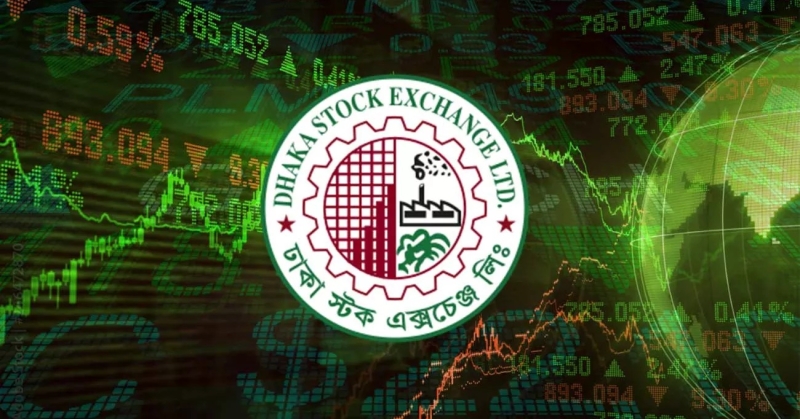- NCP Demands Impeachment, Arrest of President |
- PM Pledges to Modernise, Strengthen Border Force |
- Dhaka Tops Global Pollution List with Hazardous Air |
- Country Observes Martyred Army Day Today |
- 100 CSOs rally against Trump’s trade tactics, urge access to drugs |
Why is a defunct co’s share price soaring in stock market?

Dhaka Stock Exchange logo_11zon
Dhaka, Feb 6 - Khulna Printing & Packaging Ltd (KPPL) has remained closed for nearly three years—its factory and head office are both non-operational. Yet, its shares are being traded vigorously in the stock market, raising suspicions among investors and relevant authorities.
According to Dhaka Stock Exchange (DSE) records, despite no production activity in the past year, KPPL's share price soared from Tk 7 to a peak of Tk 59.
Currently, each share is being traded above Tk 30.
A review of DSE’s website reveals that the company has no official website.
The web address listed under Lockpur Group is non-functional, and all the contact numbers provided are inactive.
There is no information available regarding company representatives.
A Ghost Company?
A visit to Lockpur Group’s head office in Fakirhat, Bagerhat, confirms that most of its subsidiaries have been shut down for years.
KPPL’s chairman, SM Amzad Hossain, was also the founding chairman of South Bangla Agriculture & Commerce Bank.
During his tenure from 2013 to 2021, the Anti-Corruption Commission (ACC) accused him of bond fraud and money laundering. Eventually, he was forced to resign in September 2021.
In March 2021, the Bangladesh Financial Intelligence Unit (BFIU) froze the bank accounts of Amzad Hossain and his wife. Consequently, the struggling KPPL faced a financial crisis, leading to its effective shutdown.
Former employees of KPPL confirm that the company used to produce packaging for frozen fish and processed food.
Along with KPPL, another subsidiary of Lockpur Group, Bangladesh Poly Printing International, has also ceased operations.
Habibur Rahman, a former employee, states that none of Lockpur Group’s businesses are currently operational.
At its peak, KPPL employed around 250–300 workers, but now the factory is completely abandoned.
Irregular Share Trading Raises Questions
In February 2024, a DSE delegation inspected KPPL’s factory in Rupsa, Khulna, and confirmed that production had been suspended.
However, despite being a non-operational company, its shares have become a tool for market manipulation. Over the past month, KPPL’s share price has surged by more than 350%.
An anonymous senior official from a brokerage house in Motijheel reveals that this is not the first time such manipulation has occurred with KPPL’s shares.
A certain group has been exploiting weaknesses in DSE’s software, yet DSE has only issued warnings instead of taking concrete action.
On Tuesday (February 4), the Bangladesh Securities and Exchange Commission (BSEC) directed DSE to investigate the abnormal price movement of KPPL’s shares.
On 2 February, DSE had already sent a letter to KPPL seeking an explanation for the irregular trading, but the company has not responded.
When asked why BSEC has not taken stricter action, Executive Director Rezaul Karim stated that while the commission can issue direct orders, it is DSE’s responsibility to investigate and take action. BSEC is prepared to assist, if necessary.
Investors Aware of the Risks but Still Taking Chances
Discussions with investors indicate that most are aware that KPPL has stopped production and that its shares are highly risky.
Due to a liquidity crisis in the market and their ongoing losses, some investors are willing to take the risk.
Investor Tarek Hossain questions why the regulatory bodies fail to act against such companies. "Investors may make mistakes in decision-making, but why can’t the commission or the exchange house take the right action? Why don’t they delist such problematic companies?" he asks.
A History of Losses
Even when KPPL was operational, it was a loss-making company.
Financial reports show that the company incurred a loss of Tk 7.92 crore in 2019.
While it managed a profit of Tk 6 crore in 2020, its losses soared to Tk 33 crore in 2021.
The company’s latest financial statement from 2022 reports an accumulated loss of Tk 2.31 crore.
Since listing on the stock exchange in 2014, KPPL last paid dividends to investors in 2020—offering a mere 0.25% return.
Why Is KPPL Still Listed on the Stock Market?
Saiful Islam, President of the DSE Brokers Association of Bangladesh (DBA), questions the rationale behind keeping KPPL listed.
"A company that has not been in production for more than six months should not remain on the stock market. Yet, KPPL has been inactive for years, while its shares continue to be manipulated.
DSE should conduct an on-site investigation and remove such companies from the market. Keeping KPPL listed only encourages manipulators," he said.
A senior DSE official, when asked why KPPL has not been delisted, pointed to regulatory constraints. "In the past, when we delisted companies, the commission pressured us to reinstate them, arguing that the delisting process was not systematic. Since then, we have reduced direct interventions in such matters."
DSE Director Minhaj Mannan Emon highlights the lack of quality IPOs over the past decade as a key issue. "Poor-quality companies now dominate the market, creating opportunities for manipulation. It is impossible to manipulate shares of reputable companies like Square or ACI. However, companies like KPPL are destabilising the market and putting investors at risk," he explains.
The Need for a Buyback Law
KPPL’s financial records from 2022 show that 60% of its shares are held by investors, while 39% are with company directors, and 1% belongs to institutional investors.
Given this situation, investors are calling for the implementation of a buyback law for such companies.
DSE has assured that its regulatory division is closely monitoring the situation. Experts believe that after repeated market manipulation and financial failures, there is no room for further irregularities. - UNB

